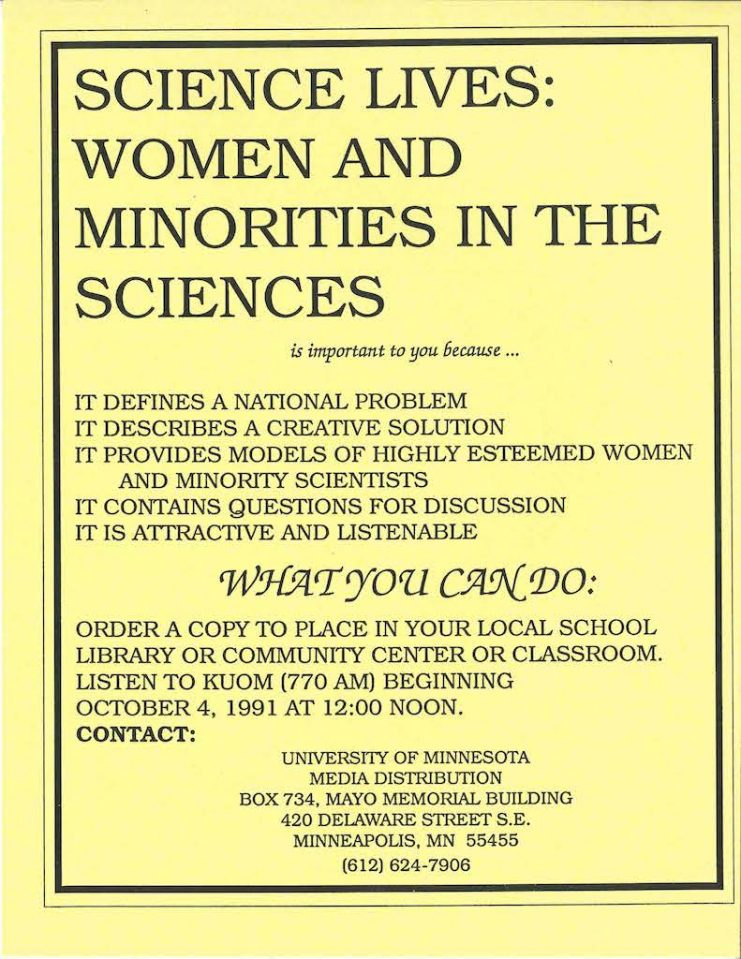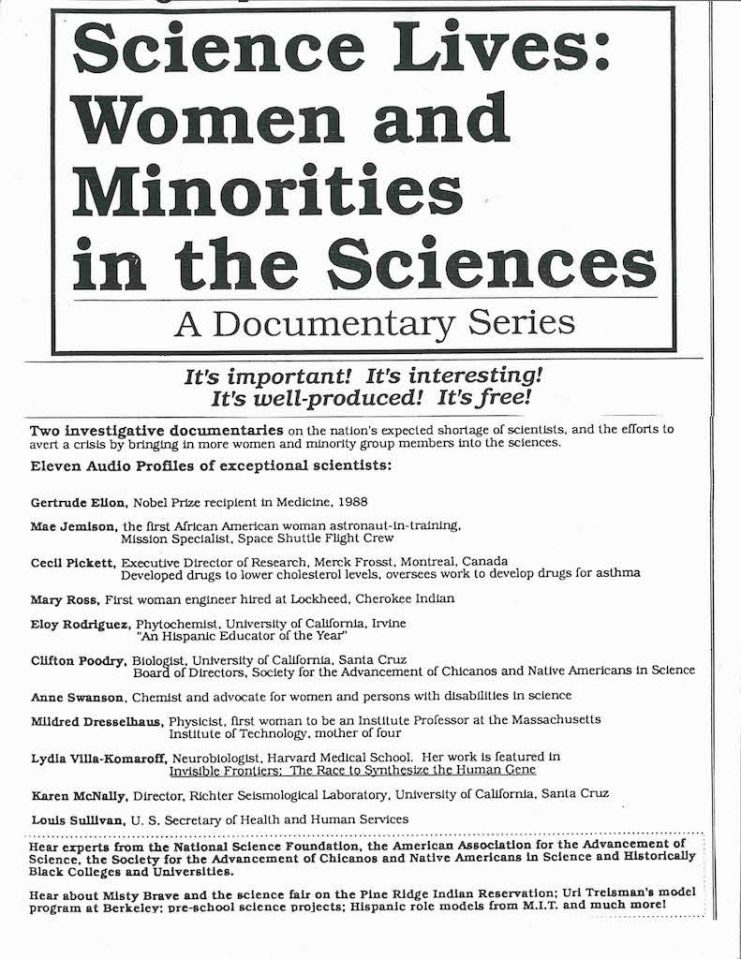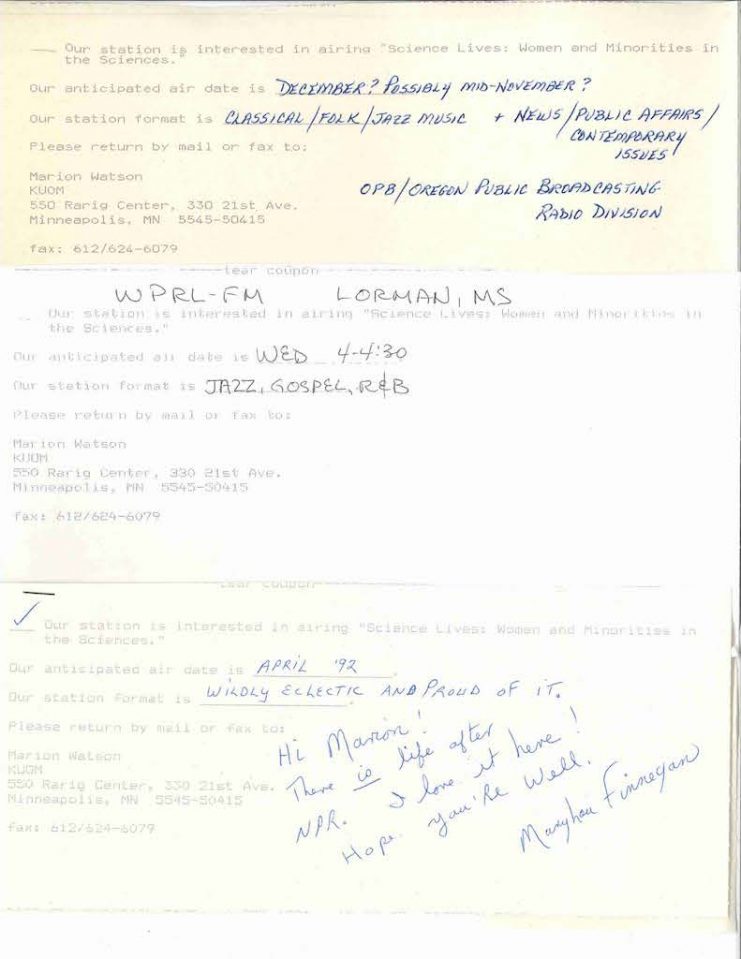Welcome back to U of M Radio on Your Historic Dial! Science is at the forefront of our program for this podcast. We interact with scientific innovation every day, and the term STEM education (Science, Technology, Engineering, and Math) is likely one you’ve been hearing for a while. In the late 1980s, there was a growing consensus that within 20 years, we would see a dearth of graduates in science-based fields, an issue that spurred the creation of today’s featured program, Science Lives: Women and Minorities in the Sciences.
You can listen to the episode here in the browser and read the script below.
Podcast (umnradio): Play in new window | Download
Episode 09: Science Lives
Hello! This is Hannah at University Archives. In this episode, I wanted to highlight one of the KUOM collection’s most contemporary programs, Science Lives: Women and Minorities in the Sciences.
In the late 1980s, research pointed towards a significant drop in students seeking Bachelor’s degrees in the sciences, with one estimate stating that by the year 2000, the United States would be facing a shortage of 430,000 degreed students in those fields.
In 1989, spurred on by faculty in the University of Minnesota College of Biological Sciences and Institute of Technology, KUOM Program Developer Marion Watson wrote an extensive grant seeking funding for a program that would address this deficit of scientists, and offer a solution: specifically appeal to and aid minorities and women in the sciences, who had historically been underrepresented. The grant states, “If changes do not occur and the nation experiences a significant drop in its pool of scientists, then not only will the fields of science be adversely affected, but so will the myriad issues before the nation — AIDS, energy, national security…which have a scientific base.” This point is expanded on in the first episode of Science Lives.

Brochure advertising Science Lives: Women and Minorities in the Sciences, encouraging schools to order the cassette package, undated.

Brochure advertising Science Lives: Women and Minorities in the Sciences, detailing the contents of each program, undated.
It was clear that educational institutions needed to reach a more diverse base of students in their earliest years. Science education was not yet given the spotlight it has today, and, as you will hear, some educators failed to spark any curiosity towards science, or they underestimated their students. The interviewees in the first episode explain from their own experiences how early education has a huge impact on future scientists, and how a student’s individual circumstances affect the kind of education they receive. In the following clips, one interviewee explains the challenges facing the children of migrant families, and how his perception of himself as a scientist changed once he gained access to a laboratory.
Dwight Gourneau, an IBM engineer who grew up on a Chippewa reservation in North Dakota explains that despite the lack of encouragement Native American students can receive, he relied on his heritage of scientific achievements to drive himself forward.
One of the main goals of Science Lives was to provide nascent scientists still in the early stages of schooling with role models, who could both provide a successful example and take on the hard work of blazing a trail for future generations.The women interviewed next point out that while it is crucial to be competitive and ambitious in one’s work, female and minority students are often tasked with proving themselves to a greater degree than their counterparts. This attitude can be detrimental to scientific collaboration and innovation.
Science Lives was distributed nationally through NPR and was also produced in cassette form, intended for use in schools and libraries. It was advertised in several science and education publications, and the producers received inquiries from around the country on how to get copies of the show. The first two episodes form a documentary on the shortage of scientists and new models of science education, but the bulk of the programs consist of interviews with such scientific luminaries as Mae Jemison, the first African-American woman in space, seismologist Karen McNally, and former Secretary of Health Louis Sullivan.
That’s all we have for this episode! Next time, we’ll celebrate the Guthrie Theater’s 54th anniversary. Thanks for listening!
The U of M Radio on Your Historic Dial podcast is produced every other week for your enjoyment. Subscribe or download on iTunes or GooglePlay so you don’t miss another moment of historic Minnesota radio.
If you enjoy our clips and want to hear or learn more, go to www.lib.umn.edu/uarchives, and search KUOM in the collection guides.
Digitization of University Archives recordings was financed in part with funds provided by the State of Minnesota from the Arts and Cultural Heritage Fund through the Minnesota Historical Society.
—Hannah O’Neill is a project archivist for the University of Minnesota Archives. To learn more about the University of Minnesota Archives, please visit www.lib.umn.edu/uarchives.





